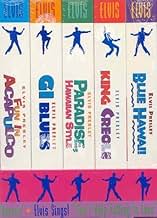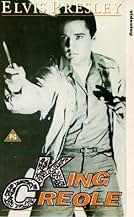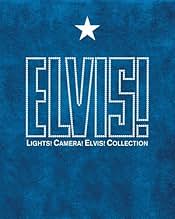AVALIAÇÃO DA IMDb
7,0/10
6,8 mil
SUA AVALIAÇÃO
Elvis Presley dá um novo ritmo à boate Bourbon Street em King Creole. Ele interpreta um jovem perturbado cuja música faz o quarteirão francês se mexer!Elvis Presley dá um novo ritmo à boate Bourbon Street em King Creole. Ele interpreta um jovem perturbado cuja música faz o quarteirão francês se mexer!Elvis Presley dá um novo ritmo à boate Bourbon Street em King Creole. Ele interpreta um jovem perturbado cuja música faz o quarteirão francês se mexer!
- Direção
- Roteiristas
- Artistas
Brian G. Hutton
- Sal
- (as Brian Hutton)
Leon Tyler
- Drug Clerk
- (cenas deletadas)
Hazel Boyne
- Woman Asking for Water
- (não creditado)
Sam Buffington
- Dr. Martin Cabot
- (não creditado)
Boyd Cabeen
- Patron
- (não creditado)
- Direção
- Roteiristas
- Elenco e equipe completos
- Produção, bilheteria e muito mais no IMDbPro
Avaliações em destaque
If LOVING YOU (1957) seemed to me at times to play like a lighter version of A FACE IN THE CROWD (1957), this reminded me of another Elia Kazan masterpiece, ON THE WATERFRONT (1954) which is quite appropriate since this is one of Elvis Presley’s better and most popular vehicles and one of the few with genuinely talented Hollywood craftsmen behind them.
This was one of the earliest film adaptations of Harold Robbins novels – the most notable of which would prove to be THE CARPETBAGGERS (1964), THE ADVENTURERS (1970) and THE BETSY (1978; which I have on VHS but have yet to watch) – but, Hollywood being Hollywood, it had its Chicago setting relocated to New Orleans; the screenplay was co-scripted by Michael V. Gazzo who was then still fresh from the Broadway success of A HATFUL OF RAIN (later filmed by Fred Zinnemann in 1957) but is nowadays perhaps best-known for his Oscar-nominated performance in THE GODFATHER PART II (1974).
Elvis is backed by a rather stellar cast: once again, lovely Dolores Hart is featured as his love interest – when he’s not being ensnared by long-suffering gangster’s moll Carolyn Jones, which doesn’t sit at all well with vicious kingpin Walter Matthau (effectively cast as the sleek heavy of the piece); the older generation is represented by Dean Jagger, appearing as Elvis’ submissive pharmacist father and Paul Stewart playing the owner of the “King Creole” establishment (who eventually hitches up with Presley’s older sister) and the only one who’s unafraid to stand up to Matthau’s control of the territory and who signs up “busboy”/failed graduate Elvis when he’s revealed to be a talented singer. Other cast members making notable contributions are Vic Morrow as Matthau’s chief lackey/thug and an uncredited Gavin Gordon as Jagger’s bossy superior.
At almost two hours, the film is slightly overlong but the meatier-than-usual plot line, the tawdry atmosphere of the Deep South (vividly-captured through exemplary noir-ish lighting by Russell Harlan), the star’s own instinctive performance (clearly modeled after his Method-trained heroes Marlon Brando and James Dean), dazzling musical interludes (whose sheer power remains undimmed) and occasional bouts of violence keep one watching. It is said that KING CREOLE was also Elvis’ favorite among his own movies and, having now watched it myself, I can easily understand why.
This was one of the earliest film adaptations of Harold Robbins novels – the most notable of which would prove to be THE CARPETBAGGERS (1964), THE ADVENTURERS (1970) and THE BETSY (1978; which I have on VHS but have yet to watch) – but, Hollywood being Hollywood, it had its Chicago setting relocated to New Orleans; the screenplay was co-scripted by Michael V. Gazzo who was then still fresh from the Broadway success of A HATFUL OF RAIN (later filmed by Fred Zinnemann in 1957) but is nowadays perhaps best-known for his Oscar-nominated performance in THE GODFATHER PART II (1974).
Elvis is backed by a rather stellar cast: once again, lovely Dolores Hart is featured as his love interest – when he’s not being ensnared by long-suffering gangster’s moll Carolyn Jones, which doesn’t sit at all well with vicious kingpin Walter Matthau (effectively cast as the sleek heavy of the piece); the older generation is represented by Dean Jagger, appearing as Elvis’ submissive pharmacist father and Paul Stewart playing the owner of the “King Creole” establishment (who eventually hitches up with Presley’s older sister) and the only one who’s unafraid to stand up to Matthau’s control of the territory and who signs up “busboy”/failed graduate Elvis when he’s revealed to be a talented singer. Other cast members making notable contributions are Vic Morrow as Matthau’s chief lackey/thug and an uncredited Gavin Gordon as Jagger’s bossy superior.
At almost two hours, the film is slightly overlong but the meatier-than-usual plot line, the tawdry atmosphere of the Deep South (vividly-captured through exemplary noir-ish lighting by Russell Harlan), the star’s own instinctive performance (clearly modeled after his Method-trained heroes Marlon Brando and James Dean), dazzling musical interludes (whose sheer power remains undimmed) and occasional bouts of violence keep one watching. It is said that KING CREOLE was also Elvis’ favorite among his own movies and, having now watched it myself, I can easily understand why.
King Creole is not only a great Elvis Presly movie, it's a great movie period. Elvis is simply terrific as hard-edged Danny Fisher, a street wise punk who hits it big time as a singer in a flashy New Orléans club, run by sleazy Matthau. The overall look of the film is excellent, it's fast paced and gritty, moody and athmospheric, and directed by the same man who brought us Casablanca. The dialouge is good and seems authentic enough, Presley is excellent and Matthau is great (as always). Plus, the songs are good. 9 out of 10.
I had an epiphany tonight. 'King Creole' is a better film than 'Jailhouse Rock'. 'Jailhouse' may contain King's best acting but 'King Creole' is his best film. Why? I would say King's acting is only slightly less convincing in 'Creole' but two things make it a better film: the cast and the story. 'King Creole' boasts the finest cast by far of any Presley film. Only Ann-Margret is sexier than Carolyn Jones, Vic Morrow has that ferocious mouth, Dean Jagger is almost perfect as the beaten father and Walter Matthau is deliciously vile. Harold Robbins' novel 'A Stone for Danny Fisher' is gritty and at times hard to read. Although the screenplay (co-written by 'Frankie Five-Angels', Michael V. Gazzo) is quite a bit more tame it is still tough. Think about it: King plays a character who kills a man in an alley with a switchblade. Here he is not 'Jailhouse Rock's amoral Vince Everett. Instead he is, at times, IMmoral. Forget all you think you know about the icon, Elvis Presley, and watch his eyes when, as Danny Fisher, he tells his father 'you go to school. I'm goin' out to make a buck'. If you don't see it, if you don't see IT, you're just not looking.
An unusual Elvis Presley vehical which actually gives him the opportunity to act. Elvis was a talented actor who was put in crap for most of his career. The Hollywood system always put him in films where he sings without doing much else. Its only when he worked with talented directors such as Michael Curtiz and Don Siegal that his abilities as an actor were fully used. King Creole(1958) is such a film where he is given the chance to act and he passes with flying colors. King Creole(1958) and the western, Charro(1968) are my two favorite Elvis Presley films because of their dark tone and the excellent acting performances by Elvis. One of the better directed Elvis films by veteran filmmaker and Casablanca(1942) director, Michael Curtiz. One of the people who wrote the story was Michael V. Gazzo, who would later play an important role in The Godfather Part 2(1974). Walter Matthaw is terrific in one of his pre Odd Couple and comedic roles. A musical Noir done during the final year of the genre before becoming extinct.
I've heard it said that this was Elvis' favourite of his own films. And no wonder. It's about the only film he ever did that allowed him to be an actor. And let's remember, Elvis had no formal acting training, and sure, the film is, as usual, peppered with great Elvis numbers and no-one doubts his talent there.
If only the Colonel had chosen to exploit the acting side a little more, perhaps we would have a lot more memorable stuff like this to remember than some of the later films, such as.....er.....er....well, there you go, I don't remember any. Perhaps Elvis would have been a lot more proud too.
Anyway, alongside Elvis is a wonderful Carolyn "Morticia Adams" Jones and a fairly early Walter Matthau, showing us that he didn't just make us laugh in his movies, but he was able to impress us with dramatic roles also.
If only the Colonel had chosen to exploit the acting side a little more, perhaps we would have a lot more memorable stuff like this to remember than some of the later films, such as.....er.....er....well, there you go, I don't remember any. Perhaps Elvis would have been a lot more proud too.
Anyway, alongside Elvis is a wonderful Carolyn "Morticia Adams" Jones and a fairly early Walter Matthau, showing us that he didn't just make us laugh in his movies, but he was able to impress us with dramatic roles also.
Você sabia?
- CuriosidadesCo-star Walter Matthau said after the death of Elvis Presley this about him: ""He was an instinctive actor...He was quite bright...he was very intelligent...He was not a punk. He was very elegant, sedate, and refined, and sophisticated."
- Erros de gravaçãoCharacter starts running twice because of editing mistake in the end of movie.
- Citações
Ronnie: Maybe we'll meet some place by accident.
Danny Fisher: Well, you tell me where you think the accident will take place and I'll make sure I'm there.
- ConexõesEdited into The Story of Elvis Presley (1977)
Principais escolhas
Faça login para avaliar e ver a lista de recomendações personalizadas
- How long is King Creole?Fornecido pela Alexa
Detalhes
Bilheteria
- Faturamento bruto mundial
- US$ 3.627
- Tempo de duração1 hora 56 minutos
- Cor
Contribua para esta página
Sugerir uma alteração ou adicionar conteúdo ausente

Principal brecha
By what name was Balada Sangrenta (1958) officially released in India in English?
Responda




































